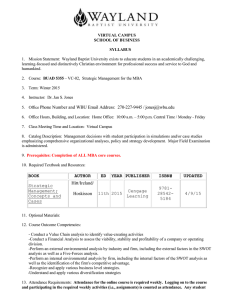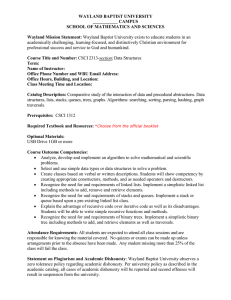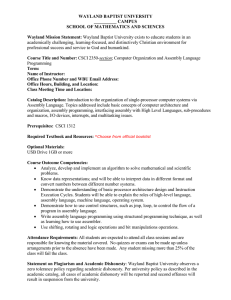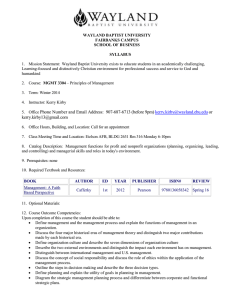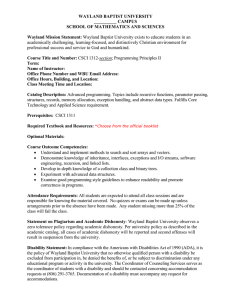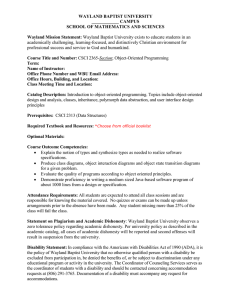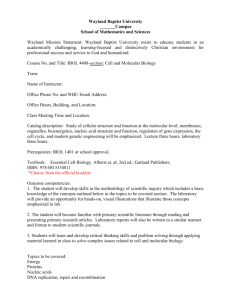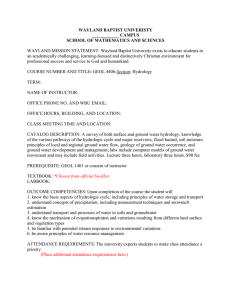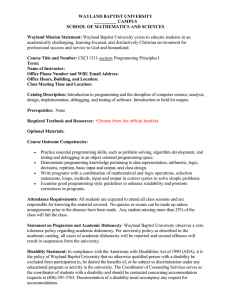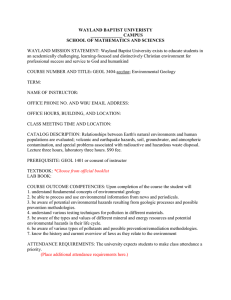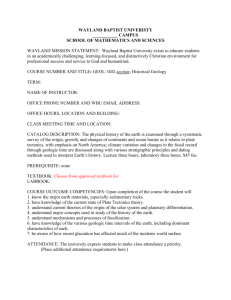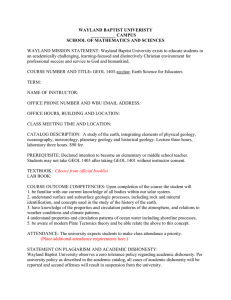BIOL 3310 - Wayland Baptist University
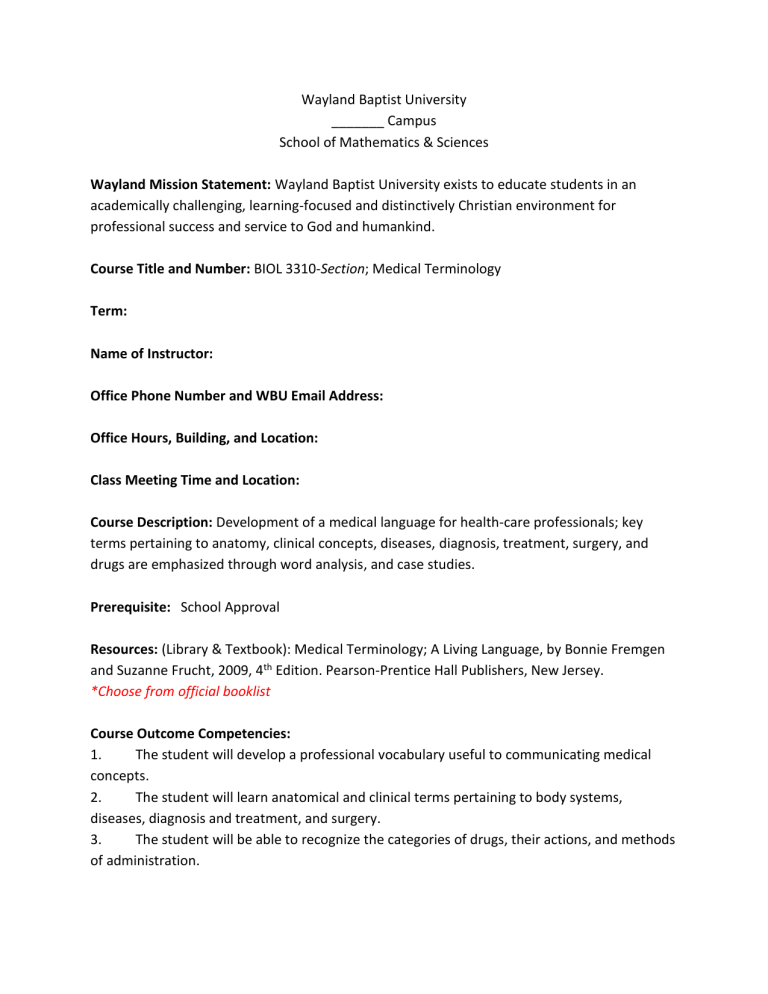
Wayland Baptist University
_______ Campus
School of Mathematics & Sciences
Wayland Mission Statement: Wayland Baptist University exists to educate students in an academically challenging, learning-focused and distinctively Christian environment for professional success and service to God and humankind.
Course Title and Number: BIOL 3310-Section; Medical Terminology
Term:
Name of Instructor:
Office Phone Number and WBU Email Address:
Office Hours, Building, and Location:
Class Meeting Time and Location:
Course Description: Development of a medical language for health-care professionals; key terms pertaining to anatomy, clinical concepts, diseases, diagnosis, treatment, surgery, and drugs are emphasized through word analysis, and case studies.
Prerequisite: School Approval
Resources: (Library & Textbook): Medical Terminology; A Living Language, by Bonnie Fremgen and Suzanne Frucht, 2009, 4 th Edition. Pearson-Prentice Hall Publishers, New Jersey.
*Choose from official booklist
Course Outcome Competencies:
1. The student will develop a professional vocabulary useful to communicating medical concepts.
2. The student will learn anatomical and clinical terms pertaining to body systems, diseases, diagnosis and treatment, and surgery.
3. The student will be able to recognize the categories of drugs, their actions, and methods of administration.
4. The student will be able to pronounce medical terms phonetically and to establish their basic meanings through an analysis of their fundamental parts.
Attendance Requirements: *Suggested
Statement on Plagiarism and Academic Dishonesty: Wayland Baptist University observes a zero tolerance policy regarding academic dishonesty. Per university policy as described in the academic catalog, all cases of academic dishonesty will be reported and second offenses will result in suspension from the university.
Disability Statement: In compliance with the Americans with Disabilities Act of 1990 (ADA), it is the policy of Wayland Baptist University that no otherwise qualified person with a disability be excluded from participation in, be denied the benefits of, or be subject to discrimination under any educational program or activity in the university. The Coordinator of Counseling Services serves as the coordinator of students with a disability and should be contacted concerning accommodation requests at (806) 291-3765. Documentation of a disability must accompany any request for accommodations.
It is the student’s responsibility to initiate contact with the coordinator of counseling services and it is to the student’s advantage to do so as soon as possible before registration to ensure that any accommodations requested are delivered in a timely manner.
Course Requirements and Grading Criteria:
University Grading System:
A = 90-100
B = 80-89
C
D
F
I
=
=
=
=
W =
70-79
69-69
Below 60
Incomplete*
Withdrawal
* A grade of incomplete is changed if the deficiency is made up by midterm of the next regular semester, otherwise, it becomes an “F”. This grade is given only if circumstances beyond the student’s control prevented completion of work during the semester enrolled and participation requirements have been met.
Examinations/Quizzes:
The study of Medical Terminology allows the student to develop the skills to build thousands of vocabulary words. There will be two(2)short exams given during the duration of the course.
These two(2) exams will constitute sixty percent(50%) of the course grade. There will be several ( one(1), for each chapter, short quizzes throughout the course, which will constitute twenty percent (20%) of the course grade. The final comprehensive exam will constitute twenty percent (20%) of the course grade. The remaining 10% of the course grade will be based upon practice exercises from each chapter.
Students shall have protection through orderly procedures against prejudices or capricious academic evaluation. A student who believes that he or she has not been held to realistic academic standards, just evaluation procedures, or appropriate grading, may appeal the final grade given in the course by using the student grade appeal process described in the Academic
Catalog. Appeals may not be made for advanced placement examinations or course bypass examinations. Appeals are limited to the final course grade, which may be upheld, raised, or lowered at any stage of the appeal process. Any recommendation to lower a course grade must be submitted through the Executive Vice President/Provost to the Faculty Assembly
Grade Appeals Committee for review and approval. The Faculty Assembly Grade Appeals
Committee may instruct that the course grade be upheld, raised, or lowered to a more proper evaluation.
Tentative Course Outline:
I. Word Building Rules
Word Parts & Combining Forms
Word Structure
II. Prefixes & Suffixes
Measurement
Position & Direction
Noun & Adjective prefixes
Plural Words
Specalties & Specialists
III. Whole Body Terminlogy
Structural Organization
Body Regions, quadrants and cavities
Direction
IV. Body Systems
Integument
Skeletal
Muscles & Joints
Nervous & Special Senses
Blood and Lymphatic
Cardiovascular
Respiratory
Digestive
Endocrine
V. Reproduction: Male & Female
Anatomy & Physiology
Pathological Conditions
Sexually Transmitted Diseases
VI. Family Health
Obstetrics
Child Growth & Development
Mental Health
VII. Cancer Medicine
Cancer Terminology
Benign & Malignant
Neoplasia Classification
VIII. Pharmacology
Drug laws & Standards
Drug Sources
Drug Names
IMPORTANT NOTE: This course does not meet the General Education requirements for
Science. This course is typically undertaken by Pre-Health/Science majors.
Revised 03/15/2015
